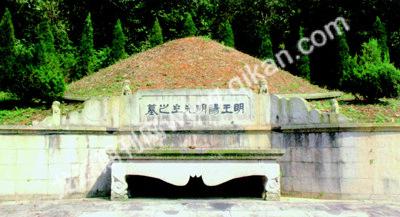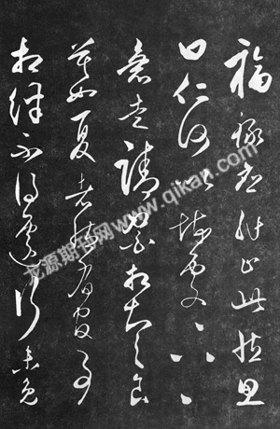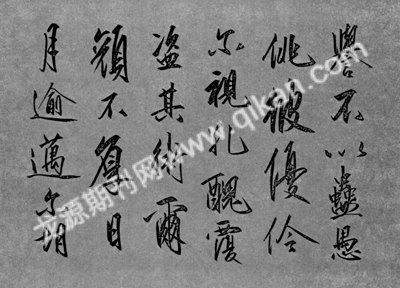Philosopher Won Three Wars
2009-04-30YangDongbiao
Yang Dongbiao

Wang Yangming (1472-1529), a philosopher, thinker and theoretician of the mid Ming Dynasty (1368-1644), is best known for his landmark rebellious ideas. His thought swept away the academy clouds of the time and ushered in the most influential learning in the mid and late years of the Ming Dynasty.
Comparatively speaking, however, his military achievement is much less known. Indeed, how could Wang Yangming, a sick person afflicted with lung disease much of his adult life, have won three military campaigns? His military success contributed to the stability of the dynasty, but incurred jealousy of some people at the court. The military successes brought him bad luck.
But his military experience was closely associated with his political thinking and career.
Wang received three military appointments in his lifetime. His first military appointment came in August of the eighth year of the reign of Emperor Zhengde. The rebels in an area bordering Fujian, Jiangxi and Guangdong Province were difficult to put down. The government sent troops there to suppress the rebellion, but all the war efforts had failed. The war minister Wang Qiong then thought of the 45-year-old Wang Yangming. Wang was then promoted to rule the southern Jiangxi Province. He reorganized the government troops and adopted new tactics and wiped out the rebels pretty fast, successfully re-stabilizing the area. His second military success was the most important. He was appointed to suppress a rebelling prince in Jiangxi Province. The last appointment was for him to serve as the military governor of Guangdong and Guangxi. Without fighting a battle, he appeased the rebels and brought peace to the border area.
The second military success best describes Wang Yangmings military capability. Zhu Chenghao was a prince who ruled in Jiangxi. Zhu Yuanzhang, the first emperor of the Ming Dynasty, sent his 24 sons to all of the country to be princes in the hope of ruling China more effectively with the help of his sons in all corners of the empire. A descendent of the 24 sons, Prince Zhu Chenghao at that time ruled Jiangxi Province. For years, he had dreamed of becoming the emperor of the Ming Dynasty. He expanded his military forces secretly and established a secret military staff office. On the other hand, the emperor did not like to do an emperors job. He enjoyed all the royal luxuries and privileges while ignoring the state affairs.

In 1519, a mutiny occurred in Fujian Province. Wang Yangming was hastily appointed to investigate and handle the rebellion. While he was on his way to Fujian Province, he learned that the prince took advantage of the situation and started his armed rebellion. It was reported that the provincial governor, a friend of Wang Yangming, had been killed in the rebellion. Wang rushed back to Jian and tried to bring the situation under control. He knew the situation would get out of hand if the prince seized Nanjing and established another dynasty there.
Wang Yangming had only thousands of soldiers. The prince had a military force of 180,000 troopers and had waited for more than 10 years for the occasion.

Wang Yangming immediately sent messengers to Beijing to report the rebellion and sent emergency calls to all neighboring regions for immediate military mobilization in defense of the emperor.
The first military strategy Wang adopted was to make the prince suspect his intimate assistants, for Wang Yangming knew that he couldnt be too defective in military affairs. He sent misinformation out and meant for it to be intercepted by the prince. The prince was alarmed to learn that Wang Yangming had already gathered several tens of thousands of troops and that two of the princes intimate staff members were Wangs spies. The prince learned that Wang had instructed the two spies to ask the prince to send troops to capture Nanjing as soon as possible so that the rebel troops could walk into a trap. The prince was consternated by the letter. It got him more than ten days to figure out that the letter was misinformation designed to win time for Wang Yangming When the prince finally realized this, ten days had elapsed.
The princes troops moved toward Nanjing. He captured cities and besieged Anqing, a gateway city to Nanjing. Wang Yangming was advised to send troops to Anqing. Instead, Wang sent troops to seize Nanchang, the military base of the rebel prince. The government troops captured the city after a difficulty battle. The rebel prince had to pull troops back to recapture Nanchang. The siege of Anqing was thus lifted.
The government army under Wangs command and the rebel forces under the rebel prince now finally met. The situation was touch and go. But Wang knew that he was greatly outnumbered and he didnt have much chance to win a head-on confrontation. Wang ordered his troops feigned to be defeated and flee, leading the rebels to chase. The chasing rebels were then led into an ambush and routed.
The victory tipped the situation. The prince cabled all his warships together to form a firm defense. Wang Yangming set fire on the ships and captivated the rebel prince. The rebellion came to an end within 35 days. □
